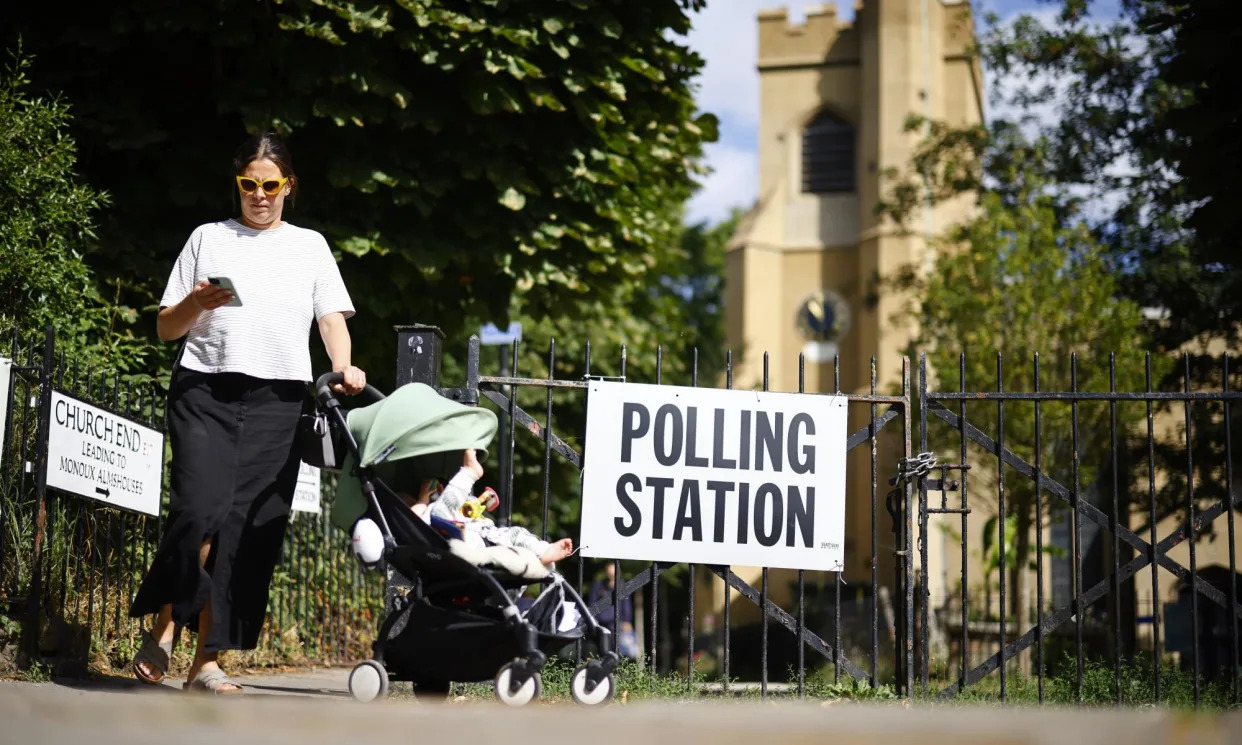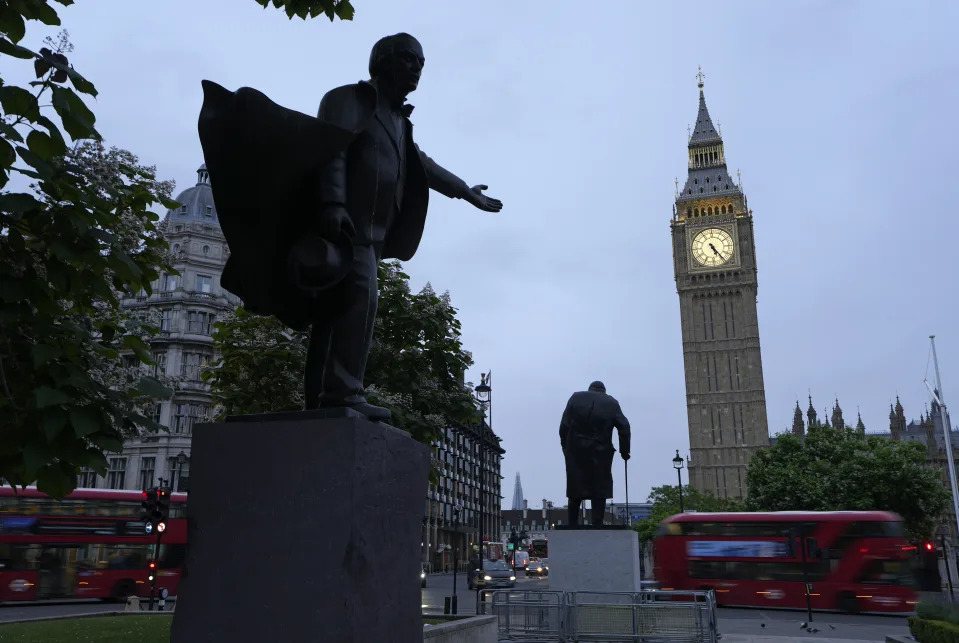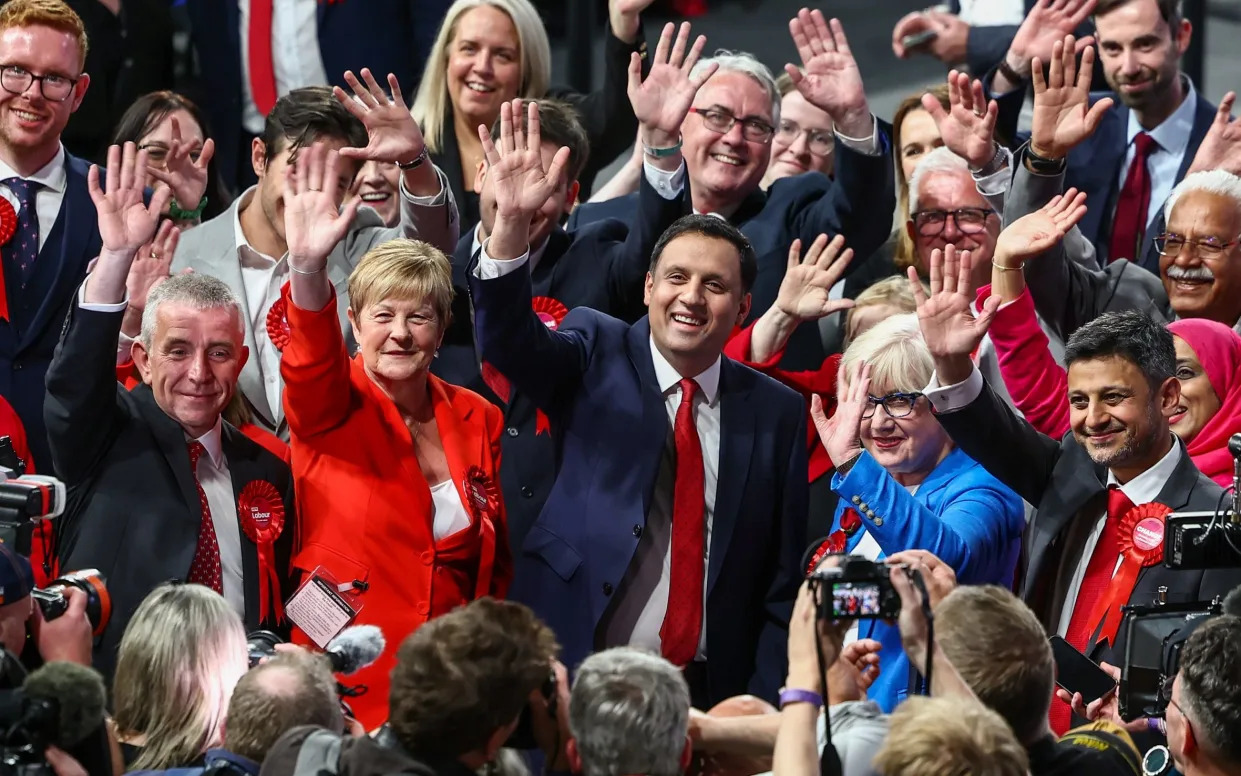Rise of smaller parties: key takeaways from voting patterns in UK election
Michael Goodier
Sun, 7 July 2024

Shifting voting patterns suggest a significant change in the makeup of the UK electorate.Photograph: Tolga Akmen/EPA
A Labour landslide after the Conservative party’s collapse was the big takeaway from Thursday’s election, but beneath the headlines, shifting voting patterns demonstrated just how much the UK’s electorate has changed.
Smaller parties achieved record vote shares, while independent candidates broke through in many places and the Liberal Democrats saw a return to their status as the third largest party.
Below are some of the key takeaways showing how the smaller parties upset both the Conservatives and Labour in the polling booth.
A breakdown in first past the post
The 2024 election was “one of the most disproportionate results in recent history”, according to the Electoral Reform Society, with Labour winning 63% of seats from only 33.8% of the vote.
The UK uses a first-past-the-post system, which tends to exaggerate the representation of larger parties in parliament in order to create majorities, and often leaves smaller parties clutching on to a handful of seats relative to their vote share.Interactive
If the UK used a more proportional system, Reform UK would expect to have 93 MPs, the Green party 44, the Lib Dems 79, the Conservatives 154, and Labour would have only 220.
A Gaza election saw a rise in independents
Related: UK general election results in full: Labour wins in landslide
As well as in the four seats that Labour lost to pro-Palestinian candidates, the results show that the Labour party saw its vote share fall across the board in constituencies with large Muslim populations.
Those included Ilford North, where the shadow health secretary, Wes Streeting, held on by just 528 votes against the independent challenger Leanne Mohamad.Interactive
Keir Starmer was heavily criticised for comments he made early on in the Israel-Gaza war to the effect that Israel had the right to withhold power and water from civilians in Gaza. He later sought to clarify the remarks.Interactive
Tactical voting may have helped the Lib Dem surge
The Lib Dems won 72 seats – a big improvement on their 2019 performance, when the party returned just 11 MPs.
The party’s strong performance may have been aided by Ed Davey’s unorthodox campaigning, which included him visiting Thorpe Park, going bungee jumping and whizzing down a waterslide.
However, the results show that tactical voting between Lib Dems and Labour probably also played a part. In seats that the Lib Dems won, Labour’s losses correlated strongly with Lib Dem gains, suggesting that some voters switched as part of an anti-Tory strategy.Interactive
Reform UK and the Greens are now future challengers
The rise in small parties and the Conservative collapse means the next election will be fought on a very different battleground from any in recent history.
Reform are now second place in 103 seats, 93 of which were won by Labour this time. Meanwhile, the Greens are second place in 47 seats, 45 of which returned Labour MPs on Thursday.Interactive
The Conservatives will hope that their 298 second-place finishes (222 of them to Labour) will enable them to bounce back when Britain next heads to the polls. Thursday’s vote could have gone a lot worse for them – of Labour’s 100 second-place finishes, 87 were in constituencies won by Tories.
What we learned from the UK's general election that will shape politics over the coming years
PAN PYLAS
Updated Sat, 6 July 2024
AP

Britain Election
The statues of former British Prime Minister's David Lloyd George, left, and Winston Churchill stand in Parliament Square in Westminster across from the Houses of Parliament in London, Friday, July 5, 2024. Britain's Labour Party swept to power Friday after more than a decade in opposition, as a jaded electorate handed the party a landslide victory — but also a mammoth task of reinvigorating a stagnant economy and dispirited nation. (AP Photo/Vadim Ghirda)
LONDON (AP) — The U.K. has its first change in government in 14 years after the Labour Party won a landslide victory in a general election Friday that saw the Conservative Party suffer its biggest defeat ever.
The new government faces huge challenges, including fixing the country's sluggish economic and social malaise resulting in part from the U.K.'s exit from the European Union, the COVID-19 pandemic, the war in Ukraine and several Conservative Party scandals.
Here are some things we learned:
A fraying two-party system
For the past 100 years, Britain's two main political parties have garnered the vast majority of votes. In 1951, for example, the Conservatives and Labour netted nearly 97% of the vote combined.
In the decades since, the trend has been clear — down. This election marked a new low, with the two parties combined barely able to muster 60%.
Despite that relatively low share of the vote, Prime Minister Keir Starmer will be able to govern with a massive majority in the House of Commons that will make it easier for him to get his legislation through. Labour more than doubled its seats while the Conservatives lost around a third of the seats they contested.
That's because in Britain's electoral system, the candidate with the most votes in each constituency wins even if they don't get a majority. This makes it easier for a party to win a seat on a relatively low share of the vote, especially when votes are spread out among many parties. These include the anti-immigration Reform UK, the Greens and the Liberal Democrats.
Conservatives punished
No election has seen this many Cabinet ministers lose their seats in Parliament, including some who were prospective candidates to replace Rishi Sunak when he steps down as leader of the party.
With all 650 contests counted, a dozen Cabinet ministers lost their seats. Perhaps the most consequential for the future of the Conservative Party is Penny Mordaunt, who gained international notoriety when she held up a large sword throughout much of last year's coronation of King Charles III. She was widely tipped to be a future leader as she has support across the party.
Others included Defense Secretary Grant Shapps, Transport Secretary Mark Harper and Education Secretary Gillian Keegan.
The casualty with the highest profile wasn't even in the Cabinet. That honor goes to Liz Truss, who was prime minister for just 49 days in the fall of 2022 and whose unfunded tax cuts roiled financial markets and sent borrowing costs for homeowners surging. Sunak, who succeeded Truss, could never shake off the legacy of her premiership.
Labour's Gaza problem
Four of Labour's candidates lost to independent challengers campaigning on a pro-Palestinian platform in constituencies with big Muslim populations.
The biggest surprise was Jonathan Ashworth, who was expected to be in Starmer's Cabinet but lost his seat in Leicester, a city in central England where a third of the population is Muslim.
Even Starmer, who has been criticized for being slow to back a ceasefire in Gaza, saw his majority in his Holborn and St. Pancras seat reduced as more than 7,000 ballots were cast for an independent candidate who had Gaza at the heart of his campaign.
Labour is back in Scotland
In 2015 Labour, which had been dominant in Scottish politics for decades, lost all but one of its seats to the pro-independence Scottish National Party.
Thursday's election almost reversed that, with Labour winning the vast majority of seats in Scotland while the SNP lost the bulk of the seats it was defending, leaving it with only nine and putting to rest any thoughts of a pro-independence referendum for Scotland any time soon.
The SNP, which governs in Scotland, has had a difficult few years, most notably as a result of a funding scandal that has embroiled former leader Nicola Sturgeon and her husband.
John Swinney, who only became first minister a few weeks ago, pledged a period of “soul searching” and admitted that the party was “not winning the argument" over independence.
Musical chairs
The newly elected candidates will officially become members of parliament on Tuesday when the House of Commons returns for the swearing-in and oath of allegiance to King Charles III.
When they take their seats on the green benches, the 412 Labour members will sit where the Conservatives have been for the past 14 years, on the right-hand side of the speaker of the House. The 121 Conservatives will be the main opposition and will sit to the left of the speaker.
The other opposition benches will look very different, however. If as anticipated the Liberal Democrats win the final seat to report, the party will have 72 members of Parliament, up from the 11 it won last time.
There will also be four Green members rather than one, and five members of the anti-immigration Reform U.K., including its leader and self-professed political agitator, Nigel Farage, who won a seat on his eighth attempt.
Reform, which contested its first election, is already saying the U.K.'s electoral system is unfair and is calling for a change, noting they got 14% of the vote, 2 percentage points more than the Liberal Democrats, but ended up with a far lower number of seats, But the U.K.'s electoral system has always been about getting the votes in the right place.
___
Follow AP’s coverage of elections around the world: https://apnews.com/hub/global-elections/
Scottish Labour leader ditches support for electoral reform
Daniel Sanderson
Sun, 7 July 2024
THE TELEGRAPH

Anas Sarwar with Labour candidates on election night - Jeff J Mitchell/Getty
The Scottish Labour leader has rejected calls to reform the UK voting system after his party profited from the “most distorted” election result in UK history.
Anas Sarwar said the public does not want a “big debate” about changes, despite the Labour conference calling for a shift towards a “proportional” model that would better reflect the preferences of the public less than two years ago.
Labour achieved a landslide victory last week, but the party won nearly two-thirds of Commons seats on a vote share of just 34 per cent.
Meanwhile, Nigel Farage’s Reform Party secured 14 per cent of the popular vote, but won just five MPs - fewer than one per cent of Commons parliamentarians.
The 30-point gap between Labour’s popular vote and seat share makes it the most skewed result ever, far outpacing the previous 22 point gap recorded in 2001 under Tony Blair.
Mr Sarwar owes his seat in the Scottish Parliament to Holyrood’s proportional representation (PR) system, after he was trounced in the Glasgow Southside seat by Nicola Sturgeon in 2021.
However, when it was put to Mr Sarwar on Sunday that the UK system had produced a “massively undemocratic” electoral result, he rejected calls to change it.
“This is the system, this is the rules, and this has been the case even when we had, for example, one MP [in Scotland] even though we had much higher votes in proportion,” he told BBC Scotland’s The Sunday Show. “That’s the system we’re in.
“Our manifesto set out that we support the current voting system and we’ve got to make this system work. Everyone knew the rules going into the election campaign. We’ve fought the election campaign and we won the election campaign.
“We don’t make the rules, we played the election by the rules. Let’s not have another big debate about changing the voting system, I’d much rather get on with changing our country.”
At the Labour conference in 2022, party delegates backed a motion that said the first past the post system does “long-term damage to the health of our democracy”.
It called on the party to commit to introducing a PR system in its manifesto for the next election, though this was rejected by Sir Keir Starmer.
The Prime Minister had hinted he supported a shift to PR when he stood for the Labour leadership in 2020.
Senior Labour figures including Greater Manchester Mayor Andy Burnham and Mark Drakeford, the former Welsh first minister, have also backed a change to the system.

Andy Burnham is backing a change to the electoral system - Jeff Moore/PA
Speaking at a Scottish rally last year, Mr Burnham said: “I don’t believe all people in all places will be equally represented in Westminster until every vote matters.”
In Scotland, Labour won 37 of Scotland’s 57 constituencies with a 35.3 per cent share of the vote.
The SNP won just nine seats, after winning 30 per cent of votes, while the Scottish Lib Dems won six with a vote share of under 10 per cent.
The row over the voting system came as Sir Keir prepared to travel to Scotland in his first official engagement since winning the keys to No 10.
In comments ahead of the visit, he vowed to put Scotland “back at the beating heart of everything we do” and usher in a new era of cooperation with the SNP-led Scottish Government.
He is to meet with John Swinney, the First Minister, during the trip.
“To the people of Scotland my message is simple and clear: You are at the heart of how we unleash prosperity across the country,” Sir Keir said. “We will rebuild a strong Scotland at the forefront of our decade of national renewal.
“My offer to the Scottish Government is the same. We can turn disagreement into co-operation and, through meaningful co-operation and a genuine seat at the table, deliver change for a generation.”
Mr Swinney will face a dilemma over whether to raise the issue of independence with the Prime Minister, after his party was trounced by Labour at the polls.
He has maintained the SNP still has a mandate for a new referendum from the 2021 Holyrood elections, though he admitted last week that he would reconsider his stance in light of the historic drubbing.
Mr Swinney said: “I look forward to welcoming the Prime Minister to Scotland where I hope to have constructive discussions with him on our shared priorities for the people of Scotland.
“This includes eradicating child poverty, growing the economy, prioritising net zero, and ensuring effective public services.
“I welcome the Prime Minister’s commitment to forge a positive relationship between our governments and for our part, the Scottish Government is committed to working constructively with the UK Government to build a better Scotland.”
No comments:
Post a Comment